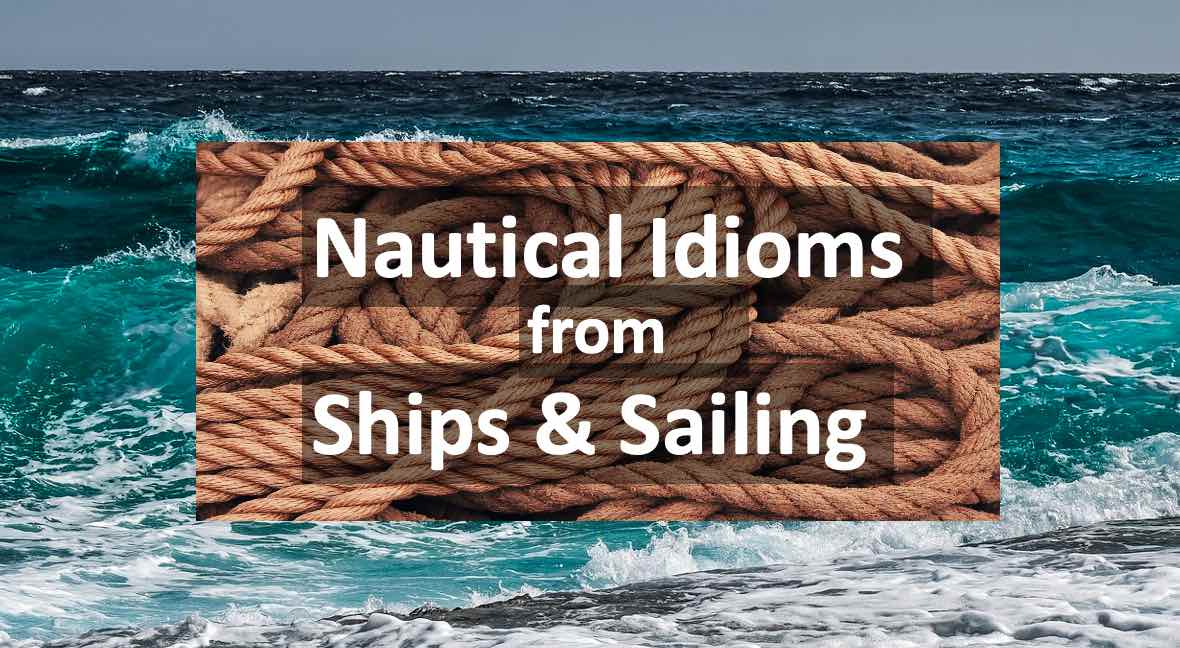Nautical English Idioms From Ships and Sailing

6 Nautical English Idioms – Can you use them in conversation?
English has many idioms with their origins in sailing and ships. These are called “nautical idioms”. How many of the nautical idioms below do you know?
If you are new to DailyStep English – welcome 🙂 Please sign up here for more free Audio Lessons.
Here is Audio Word Study #047 from Jane Lawson at DailyStep.com
Nautical idioms
.
Britain is an island and the sea is never far away. Fishing, trading and fighting wars all used to be done in ships and boats, so of course this has had an influence on our language. Let’s take a look at some commonly used expressions that have nautical origins.
.
1. Know the ropes
Original meaning: When all ships had sails, it was vital for sailors to know how to hoist the sails and secure them, using ropes and knots that they tied in the ropes to fasten them together. An inexperienced sailor was someone who did not know the ropes.
Modern example: When he started his new job, it was a few weeks before he really knew the ropes.
.
2. Show someone the ropes
Original meaning: If an inexperienced sailor did not know the ropes, someone had to show him the ropes, in other words, show him how everything worked.
Modern example: She spent her day showing a new colleague the ropes. (note: this means that she spent the day showing her new colleagues how to do the things that were necessary for the job.)
.
3. Take the wind out of someone’s sails
Original meaning: If the wind did not fill the sails, then the ship lost all power and could not progress forward. If someone takes the wind out of your sails, they say or dosomething that makes you feel less confident, motivated or determined, and therefore less able to move forward.
Modern example: I was so confident before my performance, but Tom really took the wind out of my sails when he told me I needed a lot more practice.
.
4. A loose cannon
Original meaning: Cannons are the big, metal guns with wheels that were used on battle ships. They are extremely heavy, and if a cannon was not securely fixed, it would roll around the deck and cause a lot of damage. These days, if someone is unpredictable and likely to say or do something that will cause problems, we say they are a loose cannon.
Modern example: I don’t think we should include Richard in the project team – he’s a bit of a loose cannon and we need things to go as smoothly as possible!
.
5. A shot across the bows
Original meaning: The bow of a ship is at the very front. If the captain of ship wanted to send a warning to another ship, without actually causing any damage, he would order the sailors to shoot a cannon at the ship so that the cannon ball just missed the bows.
Modern example: The workers gave a shot across the bows to their boss by threatening to go on strike if their demands were not met.
.
6. High and dry
Original meaning: If a ship was high and dry, this meant that it was stranded and unable to move anywhere because the water was too shallow, or it had become beached.
Modern example: When my bag was stolen on holiday, I was left high and dry because I had no money, no phone, no passport and no way of getting home.
.
Now, try to write your own sentences using all these nautical idioms.
Make sure these sentences are true to your own life, or about someone you know, because this will help you to remember them better.
That is all for Audio Word Study#047 on DailyStep.com.
If you enjoyed my Audio Blog, please share it. Thank you 🙂
How to speak English fluently and understand fast English
DailyStep English Audio Lessons are designed to help you learn to speak and understand English at the speed that we speak it.
No matter how good your English is, you need to be able to follow a fast conversation in order to participate.
DailyStep English courses are fully accredited and you can get an internationally-recognised certificate for your CV or resume.
How to use your lessons:
How to slow the audio:
How to Start Daily Audio Lessons
✔ Daily Audio Lessons + Premium Audio in my Blog Library
✔ Your lessons never expire – you can take them again any time
✔ Change your level any time
✔ 100% happy or your money back!










